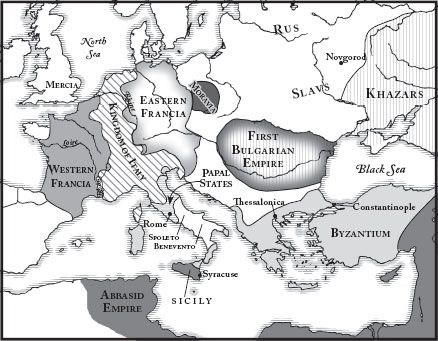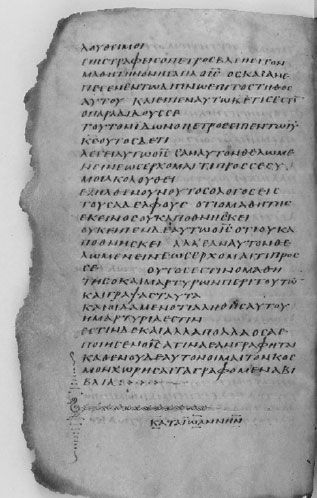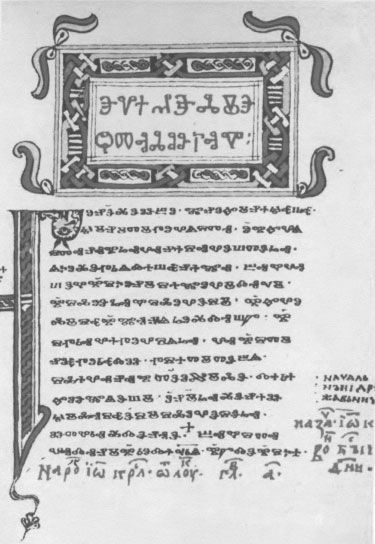The History of the Medieval World: From the Conversion of Constantine to the First Crusade (58 page)
Authors: Susan Wise Bauer

Between 856 and 886, Byzantine missionaries invent a new Slavic alphabet, Louis the German and Michael III joust over Moravia and Bulgaria, and Michael III’s complicated domestic arrangements catch up with him
I
N
856, M
ICHAEL
III of Byzantium turned sixteen years old and assumed power with a careful ruthlessness. He declared his most trustworthy uncle his heir, ordered the other regents exiled or assassinated, and shipped his mother and sisters off to a nunnery.
Constantinople was relatively stable, thanks in large part to Michael’s mother and uncle; they had presided over a council that restored icon-use to Byzantium and brought a final end to over a century of theological struggle. But the empire’s encounters with outside powers had been disastrous. The Rus had raided its land at will, Abbasid armies had beaten its troops in battle, and the Khazars had refused offers of closer alliance.
In 862, Michael was given a chance to reverse the empire’s bad luck at foreign relations. A letter from a king named Rastislav arrived at his court, asking for help. “We have no one to teach us the truth and to explain to us the meaning of Scripture,” Rastislav wrote. “Send us then, Lord, a man capable of teaching us the whole truth.”
1
This was more than a chance to send missionaries. It was an opportunity to change the political landscape.
Rastislav’s kingdom, Moravia, was less than forty years old. His uncle Mojmir, the leader of a Slavic tribe north of Bulgaria, had conquered the tribe next door and united the two territories. Mojmir had ruled this kingdom from 833 until 846, and when he died Louis the German, now king of Eastern Francia, had sent his own soldiers into Moravia to make sure that Rastislav would inherit his uncle’s throne. This was not a kindness on Louis’s part. He wanted Moravia’s king to be dependent on him, and the kingdom itself under Frankish supervision. Louis had dispatched his own Frankish missionaries to evangelize the Moravians, hoping to convert them into the Roman church, which would have given him another layer of control over Moravia’s people.

58.1: Moravia
Rastislav could see that Louis the German intended to swallow his kingdom whole. He cast his eye eastward and decided that his people would be better off submitting themselves to the patriarch of Constantinople, who owed no political favors to the Franks.
2
Michael III saw the request for what it was: a chance to whip Moravia out of Frankish hands. He immediately sent two missionaries to the Moravian court. They were brothers named Cyril and Methodius who had already travelled together as missionaries to the Khazars (it was an unsuccessful mission, as the Khazars declined to convert from Judaism). They were natives of Thessalonica, which had a large Slavic population, and they had spoken Slavic languages from birth.
*
Cyril and Methodius arrived at Rastislav’s court in 863, bearing gifts from Michael III and copies of the sacred liturgy used in the churches of Constantinople. But before the Moravians could be folded into the traditions of the eastern church, the liturgies would have to be translated into Slavonic—and Slavonic had no written form.

58.1: Greek uncial script in the fifth-century Codex Washingtonianus.
Credit: Freer Gallery of Art
Cyril, undaunted, invented a new alphabet called Glagolitic (from the Slavic word for “speak”), basing it on the Greek letters known as uncials. He and his brother spent the next three years translating the liturgy and the Gospels into Moravian. The first passage written down in this newborn language was from the Gospel of John:
In the beginning was the Word.
3
Moravian was still considered a barbaric language; certainly it ranked far, far below Hebrew, Greek, and Latin (the three languages written, by tradition, above the cross of Christ) as an acceptable tongue for worship. This made no difference to Michael III or to his missionaries. Giving the Slavs their own language, a language tied to the Greek of the east rather than the Latin of the west, did that much more to weaken Frankish control.
4

58.2: Glagolitic script in the tenth-century Codex Zographensis.
Credit: Quattuor Evangeliorum Codex Glagoliticus
While the brothers were still in Moravia, Michael III discovered that Louis the German was hedging his bets. He was also sending Frankish missionaries into Bulgaria in an attempt to do exactly what Michael III was doing in Moravia. Bulgaria was too big, too close, and too well armed to risk a Frankish-Bulgarian alliance, and Michael III decided not to play around with competing monks this time; he assembled his army and prepared to invade. Bulgaria was too important to leave to the missionaries.
The king of Bulgaria, Boris, had been considering conversion for some time. He had gone so far as to send a message to Louis the German, announcing that he was ready to join the Roman church. But the Bulgarian aristocracy was appalled by the possibility: “His leading men were very angry,” the
Annals of St. Bertin
tells us, “and stirred up his people against him, aiming to kill him. All the warriors there were in all the ten counties of that realm came and surrounded the king’s palace.”
5
Boris backtracked and stalled on a final decision, sending messages to Louis the German that he had more questions and needed more priests to come and answer them. But when Michael III’s army appeared on his frontiers and the Byzantine navy drew up to the shores of the Black Sea, Boris changed tactics. He made a deal with Michael: he would convert and be baptized in Constantinople, taking the baptismal name “Michael” in honor of the emperor, and in return, the Byzantine forces would withdraw.
6
Michael III, impressed with his success so far, now sent a missionary upriver to the Rus, but no conversions resulted; the Rus were not interested. And the missions in Moravia and Bulgaria, like all of Michael III’s foreign maneuvers, did not do him much good in the end. Boris, now Michael I of Bulgaria, remained Christian, but in 866 he announced that he would submit himself to the pope; then in 870 he reversed himself again and resubmitted Bulgaria to the patriarch of Constantinople. This too would be temporary. He had already decided that what Bulgaria really needed was its
own
state church, neither Roman nor Byzantine, in order to preserve Bulgarian independence.
Over in Moravia, Cyril and Methodius were trying to complete their work. Cyril died of illness in 869, begging his brother to continue the mission; so Methodius went on, faithfully translating the Scriptures into Slavonic. But a little more than a year after Cyril’s death, Louis the German managed to reassert himself in Moravia. He promised to help King Rastislav’s nephew, Svatopluk, usurp the throne. In 870, Frankish armies accompanied Svatopluk to the royal palace, arrested Rastislav, and handed him over to Louis. Louis took revenge for Rastislav’s turn to the east by blinding and jailing him; Rastislav died in prison not long after.
Svatopluk now ruled Moravia, and Louis the German controlled him. Frankish bishops, coming into Moravia to reorient its Christianity back towards Rome, managed to have Methodius arrested and thrown into jail. No one paid much attention to him there, and it was almost three years before the pope learned of his fate and ordered Louis the German to release him.
Methodius tried to pick his work back up, but the theological tide had turned against him; the Moravian Christians who had welcomed his efforts were now fleeing into Bulgaria to avoid any trouble with the Frankish bishops. When Methodius died in 885, his work in Moravia was in tatters.
But the Moravians who had chosen exile in Bulgaria passed their liturgy and Scriptures on to the Bulgarian clerics. The Bulgarian churches began to use Methodius’s works in preference to the Greek rituals, distancing themselves bit by bit from the eastern church hierarchy. Methodius’s disciples, attempting to follow the example of their master, began to create a new script, again based on Greek uncials, meant especially for the Bulgarian tongue. They named this script “Cyrillic,” after the missionary Cyril, and it took root and grew. A decade later, the Bulgarian church forbade its clerics to use any Greek in the liturgy. The Bulgarian church would now worship only in its own native language.
7
Methodius and Cyril had set out to free Moravia from the Franks. Instead, they freed Bulgaria from both Rome and Constantinople; but neither lived to see this.
M
EANWHILE
, M
ICHAEL
III was suffering from domestic troubles.
The troubles were almost entirely self-inflicted. Since the age of fifteen, he had been sleeping with the same woman, his mistress Eudokia Ingerina. However, his mother announced that Ingerina was not an acceptable wife, and instead ordered him to marry a woman she had handpicked for him, Eudokia Dekapolitissa. Michael had trouble defying his mother; he agreed to marry Dekapolitissa, and then after the wedding ignored her and went right on sleeping with Ingerina.
The patriarch disapproved of this crowded marriage, and to preserve appearances, Michael married off his mistress Ingerina to his best friend, a horse-trainer from Macedonia named Basil. Michael continued sleeping with her, however, and so that Basil would not be deprived, he brought one of his sisters out of her convent and installed her at court as Basil’s mistress.
8
What with climbing in and out of each other’s beds, Michael III and Basil became closer, and Basil began to get a glimpse of what
real
power could be like. He began to suggest to Michael III that Michael’s uncle and heir had too much influence around the court, and finally convinced Michael to give him permission to murder the unfortunate man. In his uncle’s place, Michael made Basil his co-emperor and heir. In 867, he also legally adopted Basil as his son; he was twenty-seven, Basil was fifty-six.
This weird adoption made a twisted kind of sense. The year before, Ingerina had given birth to a son. Technically, the child was Basil’s. In all likelihood, he was actually Michael’s. So by adopting Basil, Michael became his illegitimate son’s legitimate grandfather, and the little boy, Leo, had a legitimate path to claim the throne.
Unfortunately, the path led through Basil. Now that he was adopted, co-emperor, and heir, Basil had no more use for Michael. After a drunken banquet one night later in 867, Michael III staggered off to bed; Basil’s men murdered the emperor in his sleep, and Basil claimed the crown for himself as Basil I, founder of the new Macedonian dynasty.
Basil maintained peace, more or less, with most of his neighbors except for the Abbasid empire; the two empires continued their pattern of inconclusive and damaging battles, with the high (or low) point the Arab capture in 878 of the city of Syracuse on Sicily, which until this point had been Byzantine. Basil’s greatest project as emperor was an attempt to revise and update the laws of Justinian. He intended to publish the updated laws in an enormous collection that would be called “Purification of the Old Law.” It was an odd project for a man who had come to the throne in such a sideways manner, and it was never finished.
9
